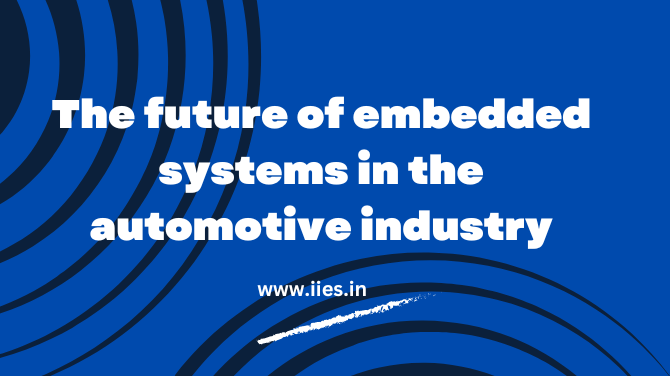The automotive industry is undergoing a significant transformation, with the rise of electric and autonomous vehicles, and the increasing importance of connectivity and data. Embedded systems, which are computer systems that are integrated into other devices and control their functions, are playing an increasingly important role in the automotive industry. Embedded software developers are at the forefront of this transformation, designing and implementing the software that runs on these systems. In this blog post, we will explore the future of embedded systems in the automotive industry and the role of embedded software developers in this new era of automotive innovation.
Electric Vehicles
One of the main drivers of the transformation of the automotive industry is the rise of electric vehicles. Electric vehicles rely on embedded systems to control their functions, from battery management to motor control. Embedded software developers play a critical role in designing and implementing the software that runs on these systems, ensuring that they operate efficiently and reliably.
As the adoption of electric vehicles continues to grow, the demand for embedded software developers with expertise in electric vehicle systems will also increase. These developers will need to be familiar with the latest technologies and standards in the electric vehicle industry, and they will need to be able to design and implement software that can handle the unique challenges of electric vehicle systems.
Autonomous Vehicles
Another major driver of the transformation of the automotive industry is the rise of autonomous vehicles. Autonomous vehicles rely on a complex network of sensors, cameras, and other devices to perceive their environment and make decisions about how to navigate it. Embedded systems are at the heart of these devices, controlling their functions and enabling them to communicate with each other and with the vehicle's central computer.
Embedded software developers are playing a critical role in the development of autonomous vehicle systems. These developers are responsible for designing and implementing the software that controls the vehicle's sensors and other devices, as well as the software that processes the data generated by these devices and makes decisions about how to navigate the environment.
As the development of autonomous vehicle technology continues, the demand for embedded software developers with expertise in autonomous vehicle systems will only increase. These developers will need to be familiar with the latest technologies and standards in the autonomous vehicle industry, and they will need to be able to design and implement software that can handle the complex interactions between the vehicle's sensors and other devices.
Connectivity and Data
In addition to electric and autonomous vehicles, the increasing importance of connectivity and data is also driving the transformation of the automotive industry. Connected vehicles rely on embedded systems to communicate with other vehicles and with the surrounding environment, enabling features such as predictive maintenance and real-time traffic updates.
Embedded software developers are playing a critical role in the development of connected vehicle systems. These developers are responsible for designing and implementing the software that enables vehicles to communicate with each other and with the surrounding environment, as well as the software that processes the data generated by these systems and provides useful insights to drivers and other stakeholders.
As the importance of connectivity and data continues to grow in the automotive industry, the demand for embedded software developers with expertise in connected vehicle systems will also increase. These developers will need to be familiar with the latest technologies and standards in the connected vehicle industry, and they will need to be able to design and implement software that can handle the complex interactions between vehicles and the surrounding environment.
Challenges and Opportunities
While the transformation of the automotive industry presents many opportunities for embedded software developers, it also presents many challenges. One of the main challenges is the complexity of the systems involved. Electric and autonomous vehicle systems are highly complex, and designing and implementing software for these systems requires a high level of expertise and attention to detail.
Another challenge is the need for collaboration between different stakeholders in the automotive industry. Embedded software developers will need to work closely with other engineers, designers, and stakeholders to ensure that their software integrates seamlessly with other systems and meets the needs of the end user.
Despite these challenges, the transformation of the automotive industry presents many opportunities for embedded software developers. The demand for expertise in electric, autonomous, and connected vehicle systems is only going to increase, and developers who can meet this demand will be well-positioned for success.
Conclusion
The future of embedded systems in the automotive industry is bright, with electric, autonomous, and connected vehicles set to transform the way we think about transportation. Embedded software developers are at the forefront of this transformation, designing and implementing the software that runs on these systems. As the demand for expertise in electric, autonomous, and connected vehicle systems continues to grow, embedded software developers who can meet this demand will be well-positioned for success in the automotive industry.

